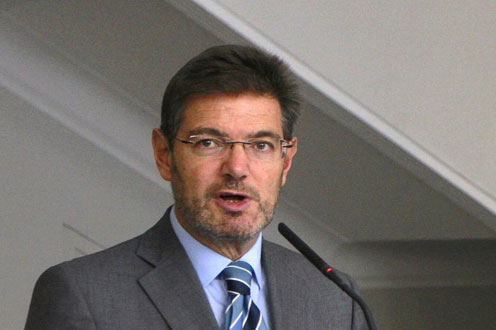Cooperation on legal issues
Spain and Portugal step up bilateral relations on justice issues
News - 2015.6.9
The two Ministers for Justice agreed on a common position on European issues such as the European Public Prosecutor, data protection, free legal aid - an issue on which the two countries established that their own respective domestic legislations go beyond the proposal made by the European Commission, and the fight against terrorism, particularly Jihadi terrorism which has sprung up recently.
Spain and Portugal, as Member States of the European Union, belong to the European Area of Freedom, Security and Justice, which is a new model of international legal cooperation.
At a criminal law level, legal cooperation is based on the progressive transition towards the principle of mutual recognition of judicial rulings, inspired by the principle of mutual trust. The instruments for mutual recognition are diverse and affect different areas such as, inter alia, the seizure of assets, the collection of financial penalties and the European Arrest Warrant.
In terms of the application of these instruments, noteworthy is the recent entry into force of Law 23/2014, of 20 November, on the mutual recognition of criminal rulings in the European Union. Under this new legislation, Spain fully transposes all instruments of mutual recognition and hence, in relation to bilateral relations with Portugal, this leads to direct judicial cooperation on these matters.
Without prejudice to the various existing multilateral treaties, Portugal is one of the few countries in the European Union with which Spain has a bilateral treaty in force on judicial cooperation in both civil and criminal affairs, dating back to 19 November 1997. This treaty seeks to facilitate cooperation between judicial authorities of border courts, thus allowing for each party to draw up claims in their own language, thereby doing away with the requirement for translation.
Previously, the Spanish minister held a meeting with representatives of Spanish law firms in Portugal, with whom he reviewed the recent reforms undertaken on justice issues in Spain, from among which he highlighted the Criminal Code and the Victims' Statute, as well as the steps being taken to implement more open, digital and innovative justice.
Furthermore, Rafael Catalá reiterated his offer of dialogue to these firms, and stated that the Ministry of Justice shared many of their goals, concerns and diagnoses. In evidence of that, he pointed to the repeal of court fees for all those individuals in all jurisdictional orders and at all hierarchical levels and the Spanish Government's intention to respect the continuity of the current collegiate model.





